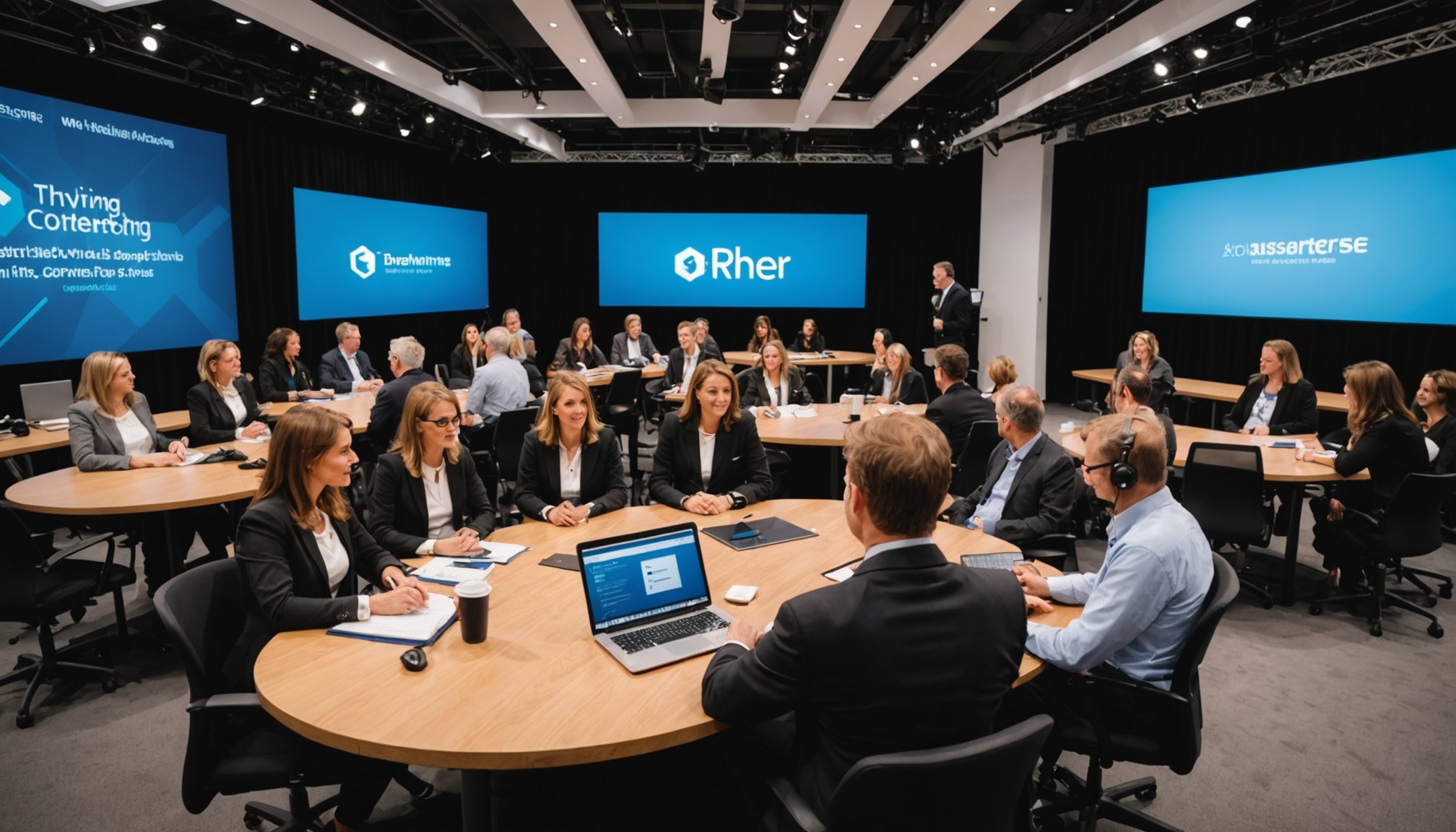Adapting to the Virtual Era
The transition to virtual events has significantly reshaped how UK event firms operate. As businesses navigate this shift, it’s crucial to understand the nuances of virtual event planning. While traditional events are typically bound by physical space and logistical constraints, online conferencing offers flexibility. This shift necessitates a change in strategy for event planners, who must now focus on digital formats and technology integration.
Virtual event planning involves several key differences compared to traditional counterparts. With online events, the emphasis is on leveraging platforms that facilitate seamless communication and engagement. This often involves using advanced software solutions that support video streaming, real-time interaction, and integrated social media. Unlike physical events, where personal interaction is immediate, virtual setups rely heavily on creating engaging digital content.
Also to read : Securing financial support: a comprehensive handbook for uk renewable energy startups to win government grants
For UK event firms, embracing technology has become indispensable. Effective online conferencing is not just about replicating physical experiences but crafting unique, interactive virtual experiences that captivate audiences. Integrating gamification, live polls, and Q&A sessions can significantly enhance participant engagement.
To succeed in the virtual arena, event planners must prioritise technological literacy, understand audience expectations, and innovate continuously. This focus ensures not only a broad reach but also a memorable experience for attendees. Adapting to the evolving digital landscape is no longer optional; it’s a necessity for sustained success.
In the same genre : Bridging the gap: innovative telehealth approaches for uk healthcare providers to reach rural communities
Essential Strategies for Online Conferences
Crafting successful online events necessitates a careful blend of well-planned components. These encompass not only the implementation of online conference strategies but also fostering robust virtual engagement. The online environment offers unique challenges, but with the right strategies, they can be transformed into remarkable opportunities.
Effective Use of Technology
Technology is the backbone of any successful online conference. Choosing the right platform is critical. It’s essential to select platforms that seamlessly enhance user experience with streamlined interaction features. Functionality is key. Platforms with integrated tools for presentation, communication, and information sharing, help maintain participant interest and improve productivity.
Innovative Engagement Techniques
Effective engagement thrives on innovative methods. Employing dynamic online conference strategies like real-time polling, which not only gauges audience sentiment but also drives engagement by making the audience feel more involved, is pivotal. Consider using visual and interactive content, such as live demonstrations or virtual tours, to keep the audience’s attention focused.
Audience Interaction and Networking
Virtual engagement isn’t complete without interactive opportunities. Integrate features like Q&A sessions and breakout rooms. These tools extend beyond mere conversation, providing platforms for networking and discussion. Encouraging networking with moderated discussion boards or themed breakout rooms allows participants to connect over shared interests, maximizing the reach and impact of your conference.
Best Practices for Planning
When planning virtual events, attention to detail can make all the difference. Begin by outlining event logistics meticulously to ensure smooth execution. Key steps include determining your platform based on audience size and technical requirements, and meticulously planning the event timeline. Effective logistics planning sets the stage for success.
Pre-event rehearsals and testing are paramount. It’s essential to conduct comprehensive equipment checks and sound tests ahead of time. This helps prevent technical issues during the live event and ensures that all participants and presenters are well-prepared and comfortable with the technology. Pre-event testing not only builds confidence but also enhances the professional quality of the event.
Tailoring content and scheduling is crucial to accommodate remote audiences. When planning a virtual gathering, consider varying time zones and availability. This flexibility ensures maximum participation and engagement. Additionally, customising content to connect with diverse audiences enriches the user experience and ultimately adds value.
To sum it up:
- Meticulous event logistics planning
- Conducting pre-event rehearsals and equipment checks
- Customising content and schedules for remote attendees
Prioritising these aspects helps pave a smooth path for a successful virtual event, establishing both relevance and connection with the audience.
Case Studies of Successful Virtual Events
Exploring successful case studies provides valuable insights and practical lessons learned from notable virtual events, enabling event planners to enhance their strategies.
Highlighting Notable UK Events
One of the most successful case studies in the UK was the 2022 London Tech Week, which seamlessly transitioned from in-person to virtual. With over 20,000 attendees, it leveraged diverse digital tools to maintain engagement. Another example is the Edinburgh International Book Festival, which reached a global audience due to live streaming options.
Key Takeaways from Each Case
An event analysis reveals that dynamic content delivery is crucial. In London Tech Week, creating interactive sessions with real-time polls and Q&As fostered connection despite the digital divide. Edinburgh’s book festival emphasised inclusive access by providing free content and fostering audience interaction through social media.
Common Themes of Success
Successful online conferences often share common themes:
- Interactivity: Engages attendees through polls, discussions, and networking opportunities.
- Accessibility: Ensures diverse attendance by removing geographical barriers.
- Content Variety: Offers a mix of pre-recorded and live sessions to cater to different preferences.
Sharing metrics, such as audience growth and engagement rates, showcases these recommendations based on best practices and serves as a guiding framework for future virtual events.
Tools and Technologies for Virtual Events
Navigating the world of virtual event technologies can be daunting, but leveraging the right resources can set you on the path to success. It’s essential to start with reliable event planning tools. These tools streamline tasks, including scheduling, ticketing, and guest management. Popular software solutions like Eventbrite and Cvent provide comprehensive services, effectively reducing the complexity of organising events.
When it comes to hosting platforms, there are several notable contenders. GoToWebinar, Zoom, and Microsoft Teams are among the leading virtual event platforms. Each offers unique advantages, with Zoom noted for its easy user interface and breakout room capabilities, while Microsoft Teams integrates seamlessly for those already within the Microsoft ecosystem.
Looking forward, emerging trends in event technology highlight the increasing use of artificial intelligence and virtual reality. These innovations aim to enhance audience engagement, providing immersive, interactive experiences. Tools leveraging AI can offer personalised content recommendations, keeping participants hooked while also gathering valuable insights for organisers. Virtual reality, on the other hand, is expected to redefine event participation by creating virtual venues where attendees can interact almost physically.
To thrive in this evolving space, keeping abreast of technology trends and continually optimising your approach with the best software solutions is key.
Resources for Continuous Learning
To thrive in any career, especially in rapidly evolving fields, continuous learning is paramount. In the virtual event planning industry, leveraging various learning resources is crucial to stay relevant.
Recommended Courses and Workshops
Courses and workshops are fundamental components of professional development. Platforms such as Coursera, LinkedIn Learning, and Udemy offer specialised courses tailored for industry professionals. These resources cover a wide array of topics, including the latest technological trends in event management and advanced project management techniques. Engaging in these workshops can significantly enhance your skills, ensuring you remain versatile and competitive.
Industry Blogs and Publications
Following industry blogs and publications is an effective way to keep abreast of current trends. Websites like Event Manager Blog, Bizbash, and Skift provide valuable insights and updates on industry dynamics. Regularly reading these resources can help you discern upcoming trends and innovative ideas that might shape your future strategies.
Networking Opportunities and Forums
Participating in networking opportunities and forums facilitates knowledge sharing and professional development. Platforms like LinkedIn Groups and Event Industry Forums offer spaces for industry professionals to exchange ideas and discuss challenges. Engaging with these communities helps you gain diverse perspectives, fostering better decision-making and problem-solving abilities. Incorporating these resources into your routine ensures that you stay informed and adept in the continuously evolving landscape of virtual event planning.











